 A student of history will see that whenever things got out of hand in society, politics, or the Church, a saint (or saints) would arise either from the grassroots or from royal birth and somehow work toward the good through his or her leadership. From the beginning of salvation history God has empowered men and women as leaders to guide His people. The Old Testament is replete with holy, faith-filled figures, and the New Testament tells of many courageous disciples of Jesus Christ who became the leaders of His Church: the apostles, the Virgin Mary, Mary Magdalene, Priscilla and Aquila and a myriad of others. After a few centuries the Church, like everything else involving people, became complicated, touched by the complexities of growth mixed in with the particular politics of the day. God knows His people and therefore He continuously inspires men and women to rise to the occasion so that we might not perish, but rather thrive as the people He intends us to be. If we discount this fact, we will miss the opportunity to do our part to work for the good rather than become overwhelmed by that which is evil, and we will also miss the invitation to hope, which is in fact, the Christian way. In other words, we should never despair, but we should also consider that perhaps we are the ones called to be leaders. 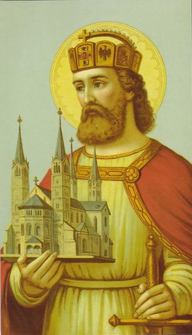 Among the wicked, power-hungry, or ego-driven who are mixed within the line of kings and queens in history, are also the good and the holy ones, and of these some were saints. Two such saints have feast days during the latter part of August so it inspires hope to remember that there have been, (and still are), many good men and women who worked diligently to make heard the voices of the poor and downtrodden and at improving the pressing issues of their times. Let us look to them as examples of good leadership from among the many who have lived. The first of these is St. Stephen of Hungary, (969-1038) whose feast is celebrated on August 16. He is credited with unifying the people of Hungary, and as their first king he reigned for 37 years. Stephen was born a pagan, but was baptized at the age of ten when his father accepted Christianity. As king, St. Stephen had all the political problems one would expect, but he worked tirelessly against paganism, trying to “Christianize” his country. He had a deep devotion to the Virgin Mary, and consecrated Hungary to her during his reign. He also set up a system of tithes to support churches and to relieve the suffering of the poor. Despite all the responsibilities and duties of being king, he made himself easily accessible to everyone and is most remembered for his generosity and care for the poor, setting an example to his people on how to live a Christian life. 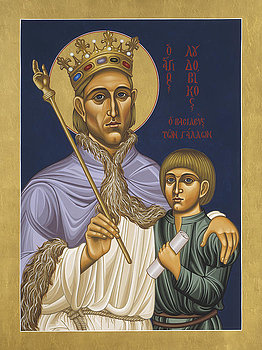 On August 25 we celebrate another royal, St. Louis IX, King of France, (1214-70). He was pious from an early age; after he became king, he protected French clergy from secular leaders who pushed against them, often violently. In 1242, France entered into war with Henry III of England, but after the war ended Louis made restitution to the innocent people whose property had been destroyed as a result of the fighting. Like St. Stephen, Louis was most well-known for his generosity and his work to alleviate poverty. Apparently, he had many poor people eat in his house daily and often he served them himself! Among his other efforts, he built hospitals and homes, and even built a hostel for women who were driven to prostitution (due to poverty) which he called the “House of the Daughters of God.” He treated everyone with dignity, and therefore he did not judge these women to be sinners, but rather, victims of poverty. Louis also established the Sorbonne, built convents and monasteries, and the beautiful cathedral, Sainte Chapelle, in Paris. He and his wife had 11 children and he was known to be a devoted father. Unfortunately St. Louis died during a Crusade to the Holy Land, but before his death he instructed his son Philip as to how he should behave as the next king, ensuring that his son reigned with the same Christian values that he had held so dearly. 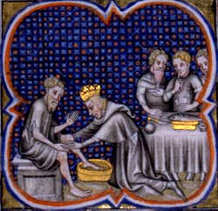 Two kings, two vastly different countries with different issues, two hundred or so years between them in history, yet we see how God inspires good leaders for His people. Of course, Stephen of Hungary and Louis IX of France were not forced to do good things. Both could have used their power and wealth for selfish intentions or to simply feed their royal egos, but instead both men chose to use the gifts they were given through birth for the greater good of the Kingdom of God. Each one took seriously the gospel discourse taught by Jesus that culminates with His statement: “Whatever you did for one of these least brothers [and sisters] of mine, you did for me.” (Matthew 25:40) Life is mysterious, and some people do seem to have obvious material wealth or interior gifts. God does not force anyone to use the gifts He gives in a particular way, but as Jesus said, “To the one to whom much is given, much is expected.” (Slight paraphrase of Luke 12:48) There are many people in the world, in our country, in our neighborhoods, and especially in our church families who have position, material means, and/or inner giftedness that they can use for the good of the community as compassionate and holy leaders. But while some are called to a higher responsibility, the Catechism tells us that all Christians are called at Baptism to be priest, prophet, and king. We are all meant to give witness as prophets by living the values which we have been taught: kindness, generosity, compassion, mercy, forgiveness, love, peace, justice and so forth. We can certainly lead by our actions, no matter how small they might seem. 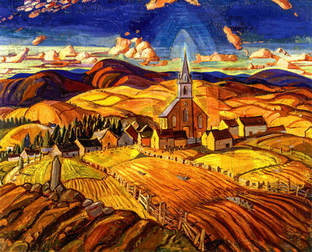 We are all called to be priests, (the common priesthood), insofar as we are meant to be prayerful and to live sacramentally. That means the Eucharist is our food and that everything we do flows from our intimacy with Jesus; it means that we live our baptismal call to holiness utilizing the gifts of faith, hope and love; that we “exercise” our Confirmation gifts to live according to the gospel; that we go to Reconciliation to receive the mercy of God so that we might also share it with others; that we live holy marriages, raising up our spouses and being raised up by them, and that those who are parents are to be good witnesses and teachers of the faith to their children. It means as parents, teachers, and friends we intentionally invite young people to seek out religious vocations and encourage them in pursuit of their call. Priests, Deacons, Brothers, and Sisters often say that they discovered a vocation when they were invited by someone who ‘saw something’ in them. And quite often, even if not personally invited to consider such a life, those who have entered into religious vocations have said someone’s actions inspired them. Educating children in the faith is a good start to all holy vocations whether to marriage, single, or religious life. Thus by teaching the faith, we are raising future leaders. 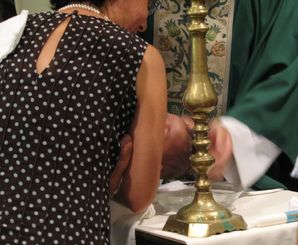 Finally, we are all called to be kingly: we are a royal priesthood. (1Peter 2:9) We are anointed with oil at Baptism, Confirmation, (and at Holy Orders for those who become clergy), specifically because this signifies that we are chosen by God. Let us not forget David the young shepherd boy in the Old Testament who was picked from among his brothers to be anointed as future king of Israel. The prophet Samuel poured oil over David’s head as a sign that he was chosen, from that point forward marked to lead for the good of God’s people. King David was God’s chosen instrument and from his lineage came Jesus the Messiah and Lord. Therefore, we need to rise to the call of our anointing at baptism to be priest, prophet, and king, to lift up the poor, to work toward housing the homeless, toward filling convents and rectories, toward justice and peace, and toward healing that which divides us. We may not have the riches of St. Stephen or St. Louis IX, but we do have the richness of love and mercy which fills our hearts. We were not consecrated as kings or queens in the political sense, but we are consecrated by the sacred oils of the sacraments and by the love of Jesus poured out for us on the Cross, and in His Body and Blood given for us to fuel our courage and inflame our hearts. In short, all Christians are called to lead by example. Rather than despairing over the times in which we live, let us rise to our anointing, accepting the invitation to hope.  May we be aware of the richness with which we have been filled that we might, with gratitude, share it with others! May we pray for the intercession of St. Stephen of Hungary and St. Louis IX of France that following their example we might continue the work of love and mercy to which every Christian has been called! May we rely on the graces given to us in the sacraments, utilizing that which we have been given! And may we act in love, even in the smallest things we do, sharing the mercy and love of Jesus with everyone who we meet! Let us continue to meet in the heart of Jesus! Peace! ©Michele L. Catanese This was written a week before it was posted. I say this because those of us on the Gulf Coast of Texas and those in the greater Houston area are in the midst of a disaster of biblical proportions. Please pray for us, as it is far from over, and please be generous with help if you can. But as I have indicated many times in this blog, there is great power in prayer. Please pray for us both for the duration of this crisis and long afterward as the cleanup will take years. Thank you. Next entry will be on September 11. If you want more on St. Stephen of Hungary, click here: http://www.catholicnewsagency.com/saint.php?n=565 For more on St. Louis IX, click here: http://archstl.org/becomingcatholic/page/saint-louis-king-france Images: 1. This is a photo I took while in Fort Davis, Texas. These birds were not actually caged, but were in a sanctuary which provided food and places for them to nest. I chose to use this particular photo because it seemed to be an invitation to hope: the bird is able to be free even though he appears to be caged. So, too, are we free to respond to the gifts God provides, and to never cease to hope. 2. This is a painting of St. Stephen of Hungary that often appears on 'holy cards,' traditionally used to provide prayers on the back that would ask the intercession of the saint depicted on the front. I chose this image because he is holding a church, or rather, it shows him as in his role of upholding the Church. 3. This is the icon, Saint Louis IX With His Son Philip III by Fr. William Hart McNichols. I chose this because it shows Louis' attitude of wanting to be a blessing to his people: if you look at the top of the scepter there is a hand in the posture of blessing. I also like that he is portrayed in his fatherly role here, passing on his desire that Philip behave in the same way, the way of the gospel, when he became king. You can find this icon at https://fineartamerica.com/featured/st-louis-ix-with-his-son-philip-iil-046-william-hart-mcnichols.html. 4. This is a tiny stained glass rendition of St. King Louis washing the feet of the poor. I chose this because he was known to serve the poor with his own hands, so the symbolism here is that the master washed the feet of the servant, just as Jesus washed the feet of His apostles at the Last Supper. King St. Louis certainly lived this gospel passage. 5. Here is a painting by Arthur Lismer, one of the famous Canadian artists in the "Group of Seven." It is called Quebec Village, painted around 1925. I chose it because of the vibrant colors, but also because it depicts the sacramental life. That is, the church is the center of the village and so the sacraments should be the point from which our lives flow, giving us the vibrancy that a life in Christ offers. 6. I took this photo at the baptism of the daughter of one of my friends. I chose this because it captured the priest at the point in the baptism in which he was anointing the baby. 7. This last image is also one of my photos. It was taken atop the Sandia Mountains outside Albuquerque, New Mexico. I chose it here because it called to mind the richness of life, a scene which implies the invitation to live in the spirit of hope rather than to give in to all the noise and circumstances which conspire to ruin our trust in God.
Elise
8/28/2017 11:26:17 am
Thank you for your blog on hope. A big hope is that we are half over Comments are closed.
|
Heart Speaks to Heart
|

 RSS Feed
RSS Feed

